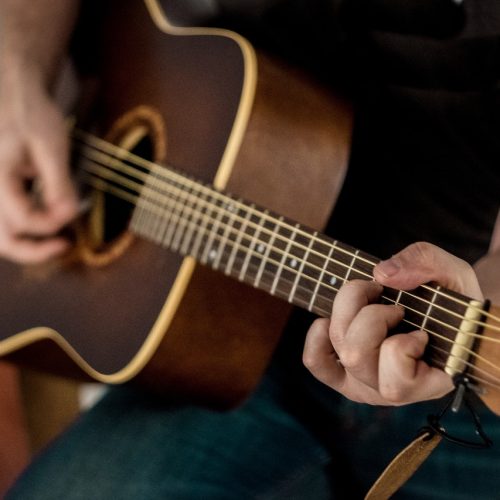The guitar is the most popular musical instrument in the world. Despite the electronic revolution in the industry, this classic instrument still attracts the teenage generation and adults alike.
Today, we’re looking at its “mini” variations, which are about two-thirds the size of a normal guitar (read: easier to play and also still very fun).
If you don’t have time for a long read, here’s a list of my personal favorites right away:
- Epiphone Dove
- Taylor GS Mini
- Fender Sonoran Mini
- Yamaha JR1 FG Junior
- Taylor BT1 Baby Taylor Acoustic Guitar
Acoustic guitars aren’t the easiest-to-play instruments out there, but they’ve got one thing going for them — ease of access. They’re pretty affordable, and you don’t need to rely on speakers, chargers, wires, or interfaces just to get sound out of them. You just pick one up and start playing! For such a versatile instrument, guitars are pretty lightweight as well, especially when you consider that they’re an all-in-one solution and you don’t need to carry anything else with them. They still are large though, which makes traveling with one a bit of a hassle.
That’s where mini guitars come into play. You can easily lay one of these down in your car’s trunk, or place them in the overhead bin on a plane or bus for safe storage.
Plus, the size of a mini acoustic guitar is much easier to manage if you’re a short king/queen, or a young player with some growing left to do. So, if you’re ready to grab one for yourself, I’m here to help you make the right choice. All of the models in this listicle are superb picks, but you’ll have to stick with me till the end to find out which one serves you best.
Let’s jump in.
1. Epiphone Dove
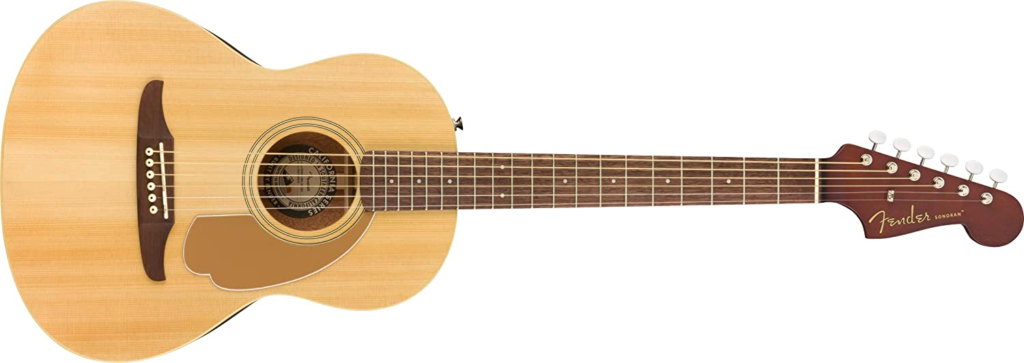
Price: $449
Pros
- Volume feels as high as a full-size guitar
- Comfortable neck design
- Sparkly top-end and rich bass response
Cons
- Mid tones seem to slightly lack
- Could take some getting-used-to for folks under 5’6’’
If you’re not satisfied with the compromised projection and volume of typical mini acoustics, this dreadnought might be the right pickup for you. It’s got a thin enough neck to be small-hand-friendly, while still offering booming acoustics and a rich voice. The design allows you to achieve touch barre chords comfortably, or effortless fretboard rundowns if you’re a lead player.
In recent years, the Epiphone brand has built up a negative image of only replicating Gibson guitars, but they have a pretty rich origin story and history to their name. The Dove itself is inspired by the 1962 Gibson Dove — just with a faster-playing, slimmer neck for maximum ease of playing.
The neck, made from hard maple, features a slim taper D profile. You’ll find the same design in many of the brand’s electric guitars. It allows you to play lightning-fast runs to the point where it’s only limited by the player’s skill and not the manufacturer’s engineering. The 1.68” nut width also adds to the playing comfort if you’ve got small hands. But with that said, the guitar’s relatively larger size can still prove slightly difficult to handle for players under five and a half feet. The dreadnought nature of the design makes its body deeper than the other, much smaller models featured in this list. But in return, you get a much higher tone breadth with a charming top end and superbly bass-y lows.
The guitar’s back and sides are all maple while the top is solid spruce. The combo is ideal for achieving top-notch clarity and punchiness in sound. The
The neck is a slim taper D profile made from hard maple. This profile is also in use on many of Epiphone’s electric models. It was comfortable and lightning fast, and paired with the 1.68” nut width, this guitar makes a great choice for any player with smaller hands who is insistent on a full size guitar with a comfortable neck. The guitar handles loud playing remarkably well, though somewhat misses out on the delicacy of quieter arrangements.
2. Taylor GS Mini
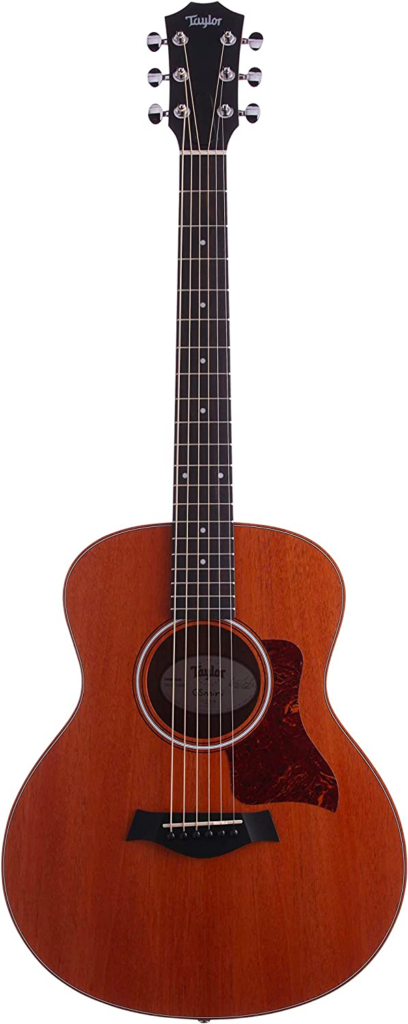
Price: $599
Pros
- Clear and sparkly sound
- Super easy to play
- Highly popular small-sized guitar
Cons
- Might be a bit unaffordable for hobbyists and beginners
- May not be loud enough for some
The runner-up on my list is a modern classic that finds its lovers amongst beginners and experts alike. We can’t possibly keep this model out of the discussion if we’re talking about small-sized acoustic guitars because that’s just how solid of a product it is. Like the Epiphone Dove, the GS Mini’s neck is also super comfy to work with. Despite its ¾-scaled form factor, it still retains the string spacing of a full-sized ax to give you a bit more room to work with on the fretboard. Speaking of fretboard, it’s proper Ebony — so you can rest assured that the company hasn’t skimped on wood quality. And well, they’d better not at a price point of almost 600 bucks!
Strictly soundwise, the guitar’s tones are bright and crispy, just what you’d expect from the Taylor brand name. The rosewood back and sides combined with its spruce top give you natural resonance and silky highs that never feel annoyingly sharp. Despite the relatively big price tag, I’d say this guitar is still one of the best deals in this market niche because it simply gets everything right. And that’s rare.
Whether you’re an aspiring beginner who wants to fall in love with their first instrument, or a seasoned pro who can justify dropping some extra cash for great tones, the Taylor GS Mini is always a worthy pickup!
3. Fender Sonoran Mini

Price: $199
Pros
- Great price
- Superb value for money
- Reduced string tension for more comfortable playing
- Comes with a gig bag
Cons
- Tones could be a tad better on both extremes, but I’m just nitpicking here
There’s a pretty huge price gap between this next mini acoustic guitar and the last one we’ve discussed. Costing merely a couple of hundred bucks, the Fender Sonoran Mini really checks a whole lot of boxes. Despite being able to suit everyone’s wallets, it still sounds surprisingly well and features an impressive build quality for its (relatively) measly price tag.
Despite having to spend so little on a brand new acoustic guitar, you still get to enjoy the peace of mind of having a brand name like Fender backing your investment. It features an iconic Stratocaster headstock, a Spruce top with a retro-yet-contemporary looking, caramel colored pickguard. Being a mini, it’s about three quarters the size of a regular guitar, featuring a parlor style body. Its remarkably narrow 1.615” nut and the 24.1-inch scale allow you to easily play complex solos, tough chord combos, as well as extended scale runs. Even though the nut size is narrow (as should be in a mini acoustic) — the space between the strings feels plenty for comfortable strumming and fingerstyle playing alike.
Thanks to the short scale, you get reduced string tension, which in turn means you won’t have to press the strings as hard to fully depress them. This is big for folks with small hands who can barely channel enough force on the fretboard for barre chords and stuff. Plus, you won’t have calluses on your fingertips as a beginner, so your fingertips will thank you for not having to press those strings as hard.
The modern C-shaped neck offers a neutral grip, while the Nato wood and walnut-finished fretboard gives this guitar a premium look and feel. Aside from offering top-tier aesthetics, these materials are also hard-wearing! Once again, you’re getting all this for under 200 bucks! And as if it wasn’t already ridiculous value for money, it even comes with a gig bag. I don’t know about you, but if I only had $200 to spend on a brand-new mini acoustic, I’d honestly be sold.
4. Yamaha JR1 FG Junior
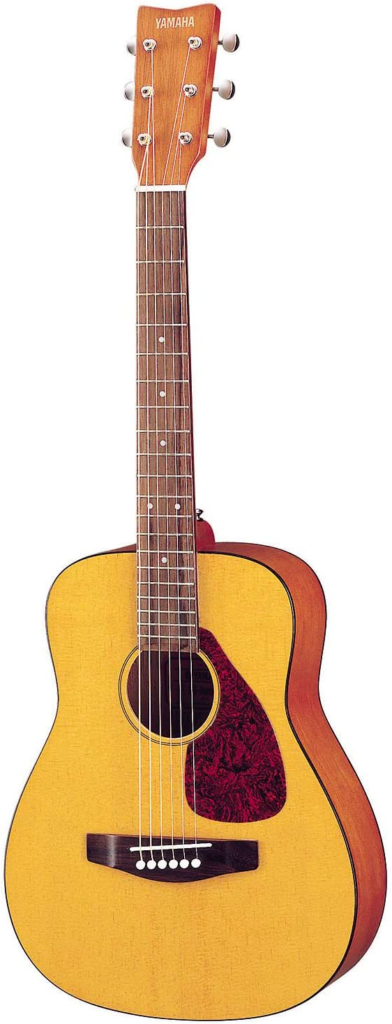
Price: $159.99
Pros
- Build quality shows praiseworthy craftsmanship
- Has a noticeably smaller body and a shorter neck
- Produces great sound for its size
- Comfortable to play for young learners and smaller hands
Cons
- Even smaller than ¾ guitars, which not everyone’s a fan of
- Fret might feel slightly congested to some, but should be fine once you get used to it
First off, let’s talk about the sound. It’s natural to be skeptical about a smaller guitar like the JR1 being able to produce a good sound, but it really delivers. It’s got a warm, bright tone that’s ideal for playing folk, blues, or even some light rock. And despite the sub ¾ design, it can still project surprisingly well, making it a great choice for playing with others or performing in small venues.
But it’s not just the sound that’s impressive. The JR1 is also lovely to play, thanks to its compact size and well-designed neck. The smaller body means you can hold it closer to your body, which can be easier on your arms and shoulders. And the neck is slim and easy to grip, so you don’t have to strain your hands or fingers to play chords or pick out melodies. It also means you can play and practice for longer sessions before getting tired, which can make a real difference in how quickly you improve your skills as a beginner or learner.
Finally, I’d say the Yamaha JR1 FG Junior is incredibly lightweight and portable. It’s easy to take with you on the go, whether you’re heading to a gig, a campfire sing-along, or just practicing in a different room of your house. And the durable construction means it can handle some bumps and bruises along the way as well!
But if I’m being honest, the guitar also has one potential downside: the narrow neck may not be the best fit for everyone. If you have larger hands or prefer a wider neck, you might find it a bit cramped. Still for most players, it shouldn’t be a major issue — and at the competitive price of just $159, I’d gladly take this minor caveat.
5. Taylor BT1 Baby Taylor Acoustic Guitar
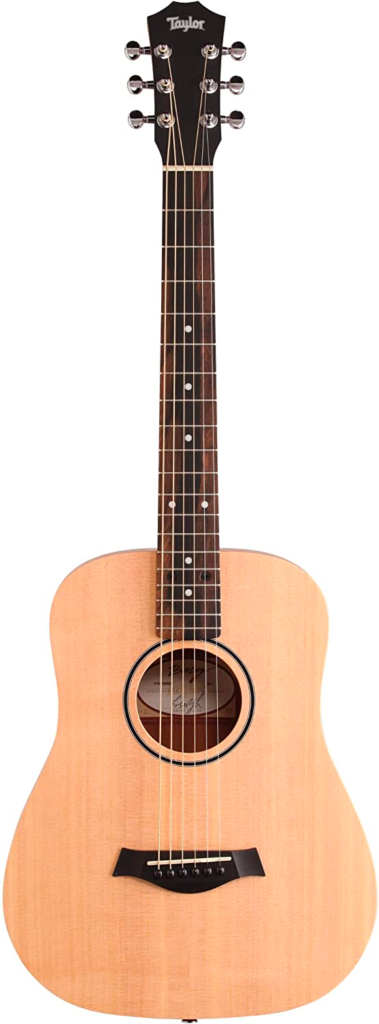
Price: $399
Pros
- Offers high tone versatility
- Features a broad dynamic range
- Most comfortable playing experience on this list (if you’d ask me)
Cons
- Yamaha and Fender’s alternatives come close at much lower prices
If you’re looking for a top-of-the-line travel guitar, the Taylor BT1 is definitely worth checking out. It’s compact, lightweight, and incredibly well-crafted, making it a great choice for musicians on the go.
Soundwise, the BT1 never fails to deliver rich, resonant tones that are on par with many full-size guitars. Whether you’re strumming chords or fingerpicking intricate melodies, the sound is clear and nuanced. This is partly due to the high-quality materials used in construction, such as the solid spruce top and layered sapele back and sides.
Speaking of construction, the craftsmanship of the BT1 is truly impressive. Taylor is known for their attention to detail, and this guitar is no exception. The finish is flawless, the frets are smooth and even, and the tuning machines are reliable and easy to use. Plus, the compact size doesn’t feel like a compromise in terms of quality.
When it comes to playability, the BT1 excels as well. The neck is slim and fast, making it easy to play even complex chords or runs. The action is low and comfortable, so you don’t have to strain your fingers to get a good sound. And despite its small size, the guitar feels solid and substantial in your hands.
Keep in mind that the BT1 is on the pricier side for a travel guitar. But if it’s premium sound quality that you’re after, the extra one (or two) hundred bucks might be worth spending. Plus, if you take care of it, it’ll probably last you a lifetime without any problems whatsoever.
Final thoughts on mini acoustic guitars
And that brings us to the end of the list of my favorite mini acoustic guitars to pick up in 2023. In conclusion, my friend, mini acoustic guitars are a fantastic option for players who are looking for a compact and portable instrument that still delivers a rich and full-bodied sound. From the travel-friendly Yamaha JR1 Junior to the unique Taylor GS Mini, there are plenty of amazing options out there. So don’t be afraid to explore the world of mini acoustic guitars and find the one that speaks to you the most. Who knows, you might just discover your new favorite guitar. Keep playing and have fun!

